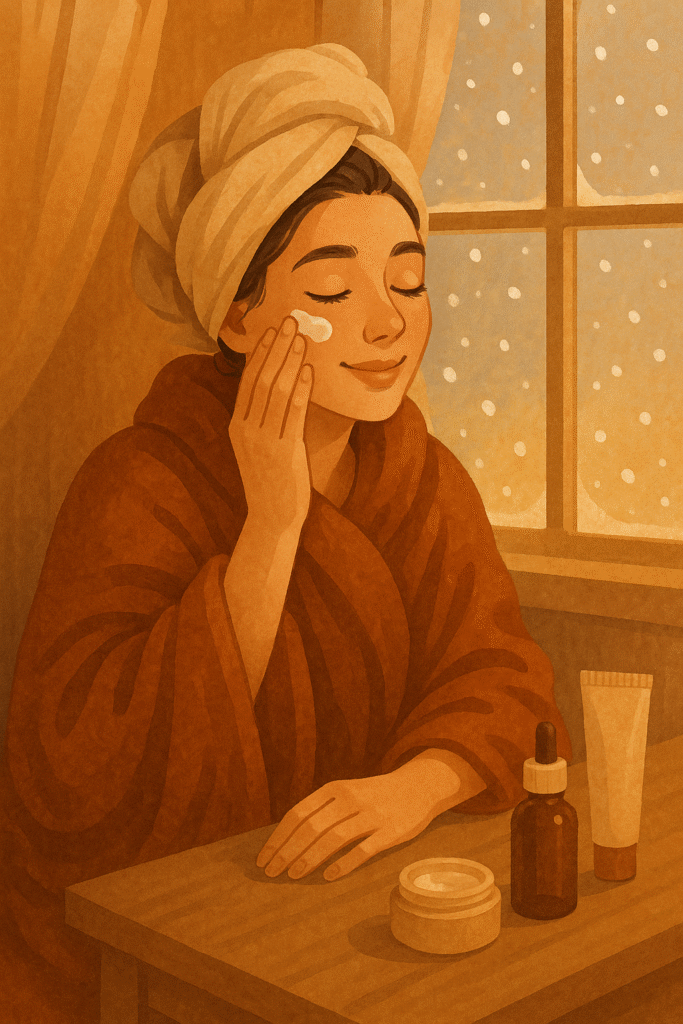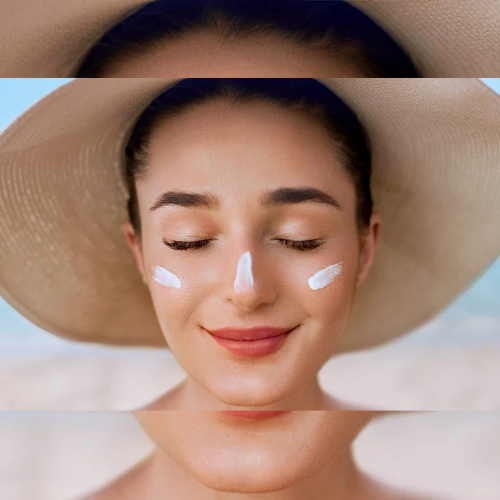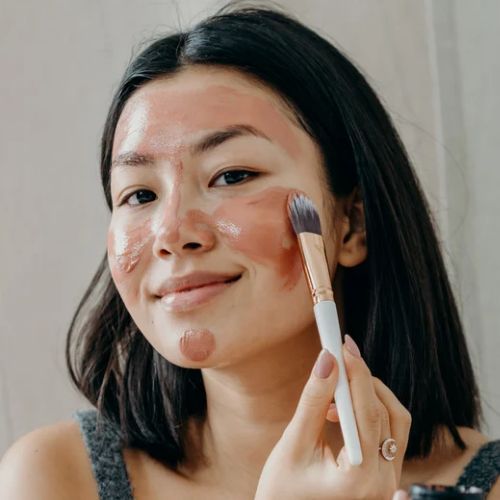Table of Contents
Winter allow warm sweaters, steaming cocoa, and icy winds. However, it also causes dry, flaky, & irritated skin in many of us. With so much advice on winter skin care circulating around, it’s difficult to distinguish between reality & fantasy. Are hot showers actually poor for your skin? Is it unnecessary to apply sunscreen during the winter? In this comprehensive guide, we will dispel some of the most frequent winter skin care myths & reveal the truth so you can take the best possible care of your skin this season.
Let’s get started.

Myth 1: You Don’t Need Sunscreen in Winter
The Myth:
In the winter, the sun is not so powerful, thus sunscreen is unnecessary.

The Fact:
UV rays exist year-round, regardless of temperature or cloud cover. Snow can reflect up to 80% of UV rays, hence enhanced your exposure.
What To Do:
Every day, apply a broad-spectrum sunscreen with SPF 30 or higher.
Apply sunscreen to exposed areas like your face, neck, and hands.
If you plan to be outside for an extended period of time, reapply sunscreen every two hours.
To care for dry skin, choose a sunscreen with hydrating elements.
Myth 2: Hot showers help you warm up in winter

The Myth:
A hot shower will moisturize & relieve your rough winter skin.
The Fact:
Hot water removes your skin’s natural oils, making it drier & more susceptible to irritation.
What To Do:
Use lukewarm water for showers & facial washing.
Confine your showers to 5-10 minutes.
Moisturize your skin shortly after a shower while it’s still damp.
Pro Tip: Try an oil-based body cleanser to stay hydrated.
Myth 3: Oily Skin Does not Need Moisturizer in Winter
The Myth:
If you have oily skin, you may avoid moisturizing during the winter.
The Fact:
Winter temperatures can cause dehydration in all skin types, mainly oily skin. When oily skin becomes too dry, it may require additional oil to compensate.
What To Do:
Use a lightweight, non-comedogenic moisturizer.
Look for moisturizing substances like hyaluronic acid and glycerin.
Apply moisturizer twice a day, even if your skin is too oily.
Pro Tip: Gel-based moisturizers are suitable for oily skin during the winter.
Myth 4: Only winter air causes dry skin
The Myth:
Cold air is the only reason your skin becomes dry in winter.
The Fact:
While cold air is a major factor, indoor heating systems, low humidity levels, & even poor hydration habits all contribute to winter dryness.
What To Do:
Use a humidifier to maintain moisture indoors.
Stay hydrated by drinking lots of water.
Apply a hydrating serum before moisturizing.
Pro tip: To enhance interior humidity, place a basin of water near radiators or heating vents.
Myth 5: Exfoliating is horrible for winter skin

The Myth:
Exfoliating in the winter will aggravate dryness & irritation.
The Fact:
Proper exfoliation is necessary to eliminate dead skin cells & allow moisturizers to penetrate effectively. The key is to escape overdoing it.
What To Do:
Exfoliate once a week with a gentle exfoliant.
Escape using hard physical scrubbing. Select enzyme-based or lactic acid exfoliants.
Always apply moisturizer after exfoliating.
Pro tip: Pay attention to how your skin feels. If it seems extremely sensitive, reduce the amount of exfoliation.
Myth 6: Drinking Plenty of Water Alone Can Treat Dry Skin

The Myth:
Drinking more water naturally hydrates your skin.
The Fact:
While drinking water is best for your health, it isn’t enough to treat dry winter skin alone. Hydration must occur both internally & externally.
What To Do:
Drink 8 – 10 glasses of water every day.
Apply a moisturizing serum containing hyaluronic acid.
Use an occlusive lotion or oil to seal in moisture.
Pro Tip: Eat hydrating foods such as cucumbers, oranges, and melons.
Myth 7: Skincare products work the same year-round
The Myth:
Your summer skincare routine will be just as adequate in winter.
The Fact:
Your skin’s requirements vary with the seasons. To preserve equilibrium during the winter, apply thicker moisturizers & softer cleansers.
What To Do:
Apply cream-based cleansers instead than foamy ones.
Apply a heavier moisturizer in the winter.
Include products containing ceramides & shea butter in your routine.
Pro Tip: Look for multi-purpose balms for excessively dry regions.
Myth 8: Natural oils are plentiful for winter skin care
The Myth:
Coconut oil, olive oil, or almond oil can totally replace moisturizers.
The Fact:
While oils can hold moisture, they cannot hydrate your skin. You require both hydration (water-based products) & moisture (oils).
What To Do:
Apply a hydrating serum first.
To seal in hydration, apply an oil-based moisturizer.
Apply face oils as an extra layer, not as a replacement.
Pro Tip: Select non-comedogenic oils such as argan or jojoba oil.
Myth 9: Skincare stops at the face
The Myth:
Winter skincare is overall facial care.
The Fact:
Your body, hands, feet, and lips are all affected by cold conditions & require specific care.
What To Do:
Apply hand cream on a regular basis.
To protect your lips, use a lip balm with SPF.
After you have had a shower, moisturize your body.
Pro Tip: Wear gloves & socks after applying cream at night to improve absorption.
Myth 10: More moisturizer provide better hydration

The Myth:
Using extra moisturizer will alleviate dryness faster.
The Fact:
Layering numerous creams is more effective than using a single moisturizer. Too much product might block pores, diminish absorption.
What To Do:
Start with a moisturizing serum.
After that, use moisturizer.
If required, seal with face oil or balm.
Pro Tip: Apply moisturizer every morning & night.
Winter Skincare Routine: A Quick Recap
Here’s a simple daily ritual to hold your skin shining all winter:
1. Cleanser: Apply a creamy, moisturizing cleanser.
2. Toner: Apply an alcohol-free moisturizing toner.
3. Serum: Use a serum containing hyaluronic acid or glycerin.
4. Moisturizer: Apply a thick, nourishing moisturizer.
5. Sunscreen: Use SPF 30 or higher per day.
6. face Oil (Optional): Seal in hydration with a light face oil.
Weekly Add-Ons:
Exfoliate lightly once each week.
Use a moisturizing facial mask.
Final Thoughts
Winter skincare doesn’t entail following every fad or misconception you hear. It’s about understanding your skin’s requirements & making informed decisions.
You can hold your skin healthy & radiant all season long by debunking five popular winter skin care myths & implementing scientifically proven procedures.
Remember to hydrate, protect, and nourish your skin every day.
Did you learn anything new today? Share this story with your friends to help them rebut these winter skincare myths.
